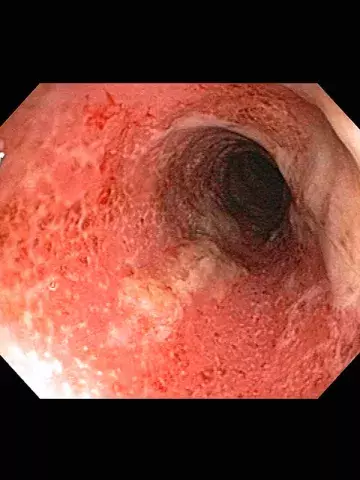Early-life diet may affect subsequent inflammatory bowel disease risk
By Rebecca Jenkins
A diet high in fish and vegetables at 1 year of age is linked with a lower risk of later developing inflammatory bowel disease (IBD), research suggests.
Early-life diet was known to have a significant impact on gut microbiota composition, which was likely an important factor in the pathogenesis of IBD, researchers wrote in Gut, yet few studies had assessed early-life diet and risk of the disease.
Using survey data from two Scandinavian birth cohorts, researchers followed 81,280 participants from birth to adolescence, with 307 of the group receiving an IBD diagnosis during follow up. Parents were asked to answer a questionnaire about their children’s diets when they were aged 12 to 18 months and 30 to 36 months.
Researchers used a modified version of the Healthy Eating Index to assess diet quality, with a higher score reflecting a higher intake of vegetables, fruit and fish and a lower intake of meat, sweets, snacks and drinks.
They found medium- and high-quality diets at 1 year of age were associated with an overall 25% lower risk of IBD compared with a low-quality diet at the same age. High fish intake and high vegetable intake at 1 year of age were both associated with a lower overall risk of IBD. However, intake of sugar-sweetened beverages was linked with an increased risk of the disease. By 3 years of age, only fish intake was associated with a reduced risk of later developing IBD, particularly ulcerative colitis.
‘Since the gut microbiome seems to develop very early in life, diet at 1 year rather than at 3 years may have a stronger impact on the microbiome,’ the researchers wrote.
‘While non-causal explanations for our results cannot be ruled out, these novel findings are consistent with the hypothesis that early-life diet, possibly mediated through changes in the gut microbiome, may affect the risk of developing IBD.’
Commenting on the findings, Adjunct Associate Professor Chris Pokorny, Consultant Gastroenterologist at Sydney Hospital, Sydney, said the large prospective study appeared robust but a limitation was that the questionnaire used to record children’s diets had not been validated.
‘In addition, exposure to additives and emulsifiers in baby foods, thought to play a role in pathogenesis of IBD, may not have been detected by the questionnaire,’ he told Medicine Today.
Professor Pokorny, who is also an Adjunct Associate Professor of Medicine at UNSW Sydney, said environmental factors, particularly changes in diet, have been thought to play a role in the increasing incidence of IBD worldwide.
‘Although the exact role of diet in the pathogenesis of IBD is unclear, it seems sensible to recommend high quality diets rich in fish and vegetables rather than diets high in processed foods and sugar-sweetened beverages,’ he said.
These diets also potentially conferred other benefits, especially with coronary artery disease, Professor Pokorny noted.


